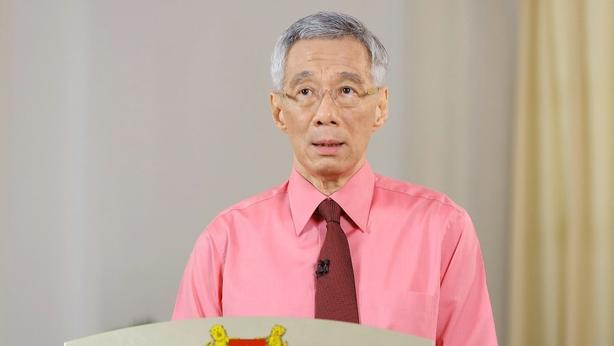 Singapore Prime Minister Lee Hsien Loong speaks during a live address to the nation in Singapore, June 23, 2020. (MINISTRY OF COMMUNICATIONS AND INFORMATION OF SINGAPORE / HANDOUT VIA XINHUA)
Singapore Prime Minister Lee Hsien Loong speaks during a live address to the nation in Singapore, June 23, 2020. (MINISTRY OF COMMUNICATIONS AND INFORMATION OF SINGAPORE / HANDOUT VIA XINHUA)
Singapore’s Prime Minister Lee Hsien Loong laid out the early missteps his government made in dealing with the coronavirus pandemic this year in a speech Wednesday, warning against relaxing containment efforts too early.
Lee’s assessment of the virus response reflects the challenges that cities face as they grapple with how and when to reopen their economies, with the ever-present threat of a resurgence in cases
“With hindsight, we would certainly have done some things differently,” Lee said in his first major parliamentary speech since winning re-election in July. “I wish we had known earlier that people with COVID-19 were infectious even when asymptomatic.”
ALSO READ: S'pore expat jobs under threat in recession, local hire push
Lee’s assessment of the virus response reflects the challenges that cities face as they grapple with how and when to reopen their economies, with the ever-present threat of a resurgence in cases.
Hong Kong plans to allow gyms, massage parlors and some sports venues to reopen beginning Friday, as virus cases drop off from record highs that prompted it to reinstate some measures in recent weeks.
UK Prime Minister Boris Johnson had to urge parents to send their children back to school, amid growing concern among some teachers and union officials that it’s not safe to do so.
Lee said Singapore should taken certain steps given what it knows about the disease now. He said Singapore should have quarantined all returning citizens from abroad earlier, rather than just those from certain countries initially.
ALSO READ: Singapore migrant worker mental health in spotlight
Singapore would have tested all of the returning citizens before releasing them from quarantine, even if they did not show any symptoms, instead of assuming that no symptoms meant no infection, Lee said.
The country would also have recommended that everyone wear face masks sooner than it did, he added.
Lee said Singapore would also have acted more aggressively and sooner on the migrant worker dormitories; while authorities stepped up precautions it thought were adequate, bigger clusters broke out in the dorms that “threatened to overwhelm us”.
Some health experts have said Singapore was too slow to revise its response to this virus, leaning initially on a blueprint honed during its experience in 2003 with Severe Acute Respiratory Syndrome, or SARS.
ALSO READ: Singapore rejects herd immunity as strategy to tackle virus
Unlike SARS, the novel coronavirus can manifest with little or no known symptoms, making responses that just focus on tracing people who have been in immediate contact with a confirmed case less effective. Countries like South Korea that pivoted to a more expansive community testing model earlier on have had more prolonged success in containing their outbreaks.
“At the time, we took the best available scientific advice,” Lee said. “All this is wisdom after the fact. We must learn from these errors, and do better the next time. But in the fog of war, it is not possible always to make” the right decisions, he said.
Singapore, which was lauded globally for its efforts to contain the outbreak in its early days, had a major setback when infections spread among its migrant worker community housed in close living quarters. The country ramped up its virus response, made masks mandatory, imposed a two-month partial lockdown, and now has among Southeast Asia’s highest reported rates of testing. The number of cases in the city-state’s wider community remains relatively small, and have been declining, while fatalities are low.
READ MORE: Singapore defends selective testing, says it yielded results
Singapore has built up contact tracing and testing capabilities and can do about 20,000 laboratory tests a day today, Lee said. With pooled testing, it can test several times that number of persons, he added.
Singapore has also more than doubled its intensive care capacity and set up temporary community care and isolation facilities for patients with mild symptoms, creating more beds than all its acute hospitals put together, he said.
Lee also warned against the strategy of allowing the virus to spread in the population to achieve herd immunity, and urged vigilance amid calls for a relaxation of social distancing measures as people grow weary of the prolonged rules.
“The COVID-19 virus remains as infectious and potent as it was before,” Lee said. “If we relax these measures now because the numbers have come down, we will have a resurgence.”


